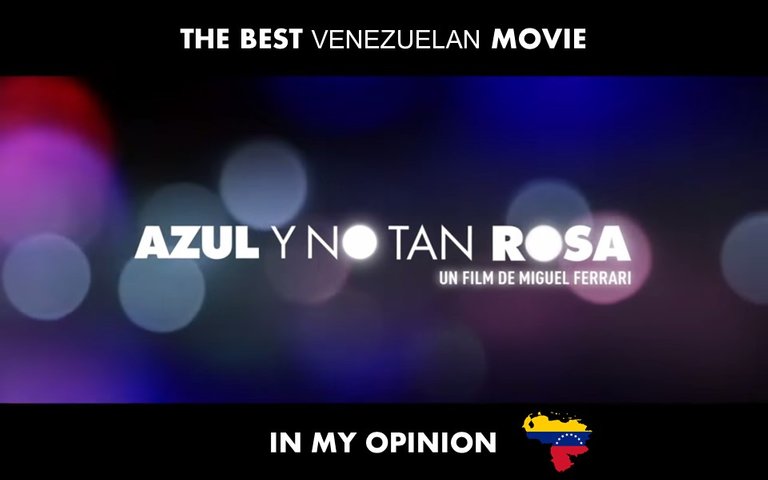
Azul y no tan rosa… Película venezolana con coproducción española, escrita y dirigida por Miguel Ferrari que nos cuenta como es la otra cara de la moneda cuando se trata de la diversidad en Venezuela, un tema que con el pasar de los años se ha vuelto más fácil de abordar, pero que rompió muchos esquemas cuando se estrenó en noviembre del 2012.
Azul y no tan Rosa (Name in English: My straight son) ... Venezuelan film with spanish co-production, written and directed by Miguel Ferrari that tells us about the other side of the coin when it comes to diversity in Venezuela, a subject that over the years has become Easier to tackle, but one that broke a lot when it was released in November 2012.
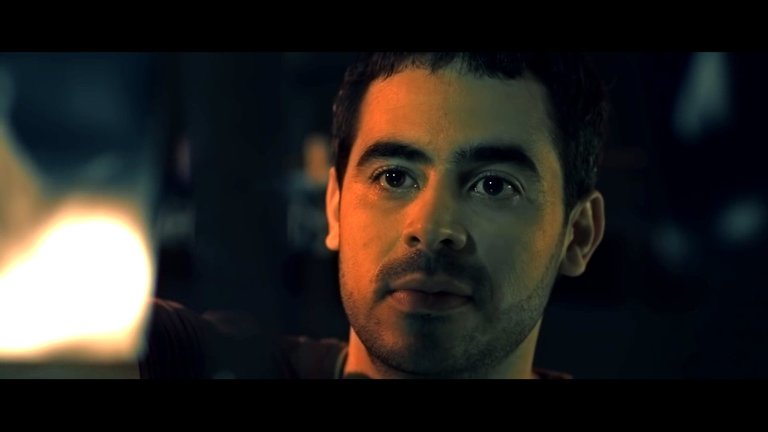
No es la típica película venezolana a la que estamos acostumbrados ver, esas donde se muestran drogas, prostitución o el bajo mundo venezolano, además de que rompe el estereotipo de que “Todos los gays son peluqueros y floristas, afeminados… maricones”, puesto que nuestro protagonista y su pareja son un reconocido fotógrafo y un Médico ginecólogo respectivamente. Trata temas como la homosexualidad, homofobia o intolerancia y la violencia de género, algo que es muy raro de ver en producciones venezolanas.
It is not the typical Venezuelan film that we are used to seeing, those where drugs, prostitution or the Venezuelan underworld are shown, in addition to breaking the stereotype that "All gays are hairdressers and florists, effeminate ... fags", since our protagonist and his partner are a renowned photographer and a gynecologist respectively. It deals with topics such as homosexuality, homophobia or intolerance and gender violence, something that is very rare to see in Venezuelan productions.
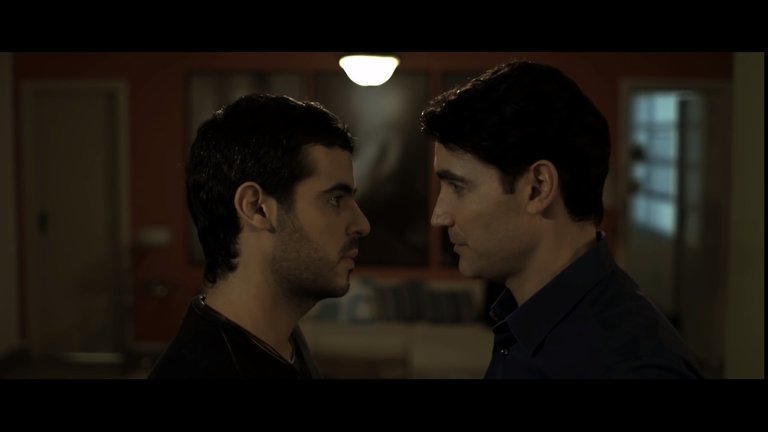
Inicialmente cuenta la vida de Diego, un reconocido fotógrafo que esconde de su familia su sexualidad y su pareja, con quien lleva una relación tranquila y dispuesto a dar el siguiente paso con este, pero que cambiará por algunos eventos desafortunados y otros imprevistos ya que, de la noche a la mañana tiene que hacerse cargo de su hijo a quien no ha visto en años.
Muchas historias se cruzan, como la violencia doméstica que sufre Perla Marina, la discriminación a Delirio por ser transgénero, además del irrespeto que recibe Diego por parte de su familia a causa de su sexualidad, que trata de ocultarla, pero termina revelándola.
Initially it tells the life of Diego, a renowned photographer who hides his sexuality and his partner from his family, with whom he has a quiet relationship and willing to take the next step with him, but that will change due to some unfortunate and other unforeseen events since he has to take care of her son, whom she hasn't seen in years.
Many stories intersect, such as the domestic violence suffered by Perla Marina, the discrimination against Delirio for being transgender, in addition to the disrespect Diego receives from his family because of his sexuality, which tries to hide it, but ends up revealing it.
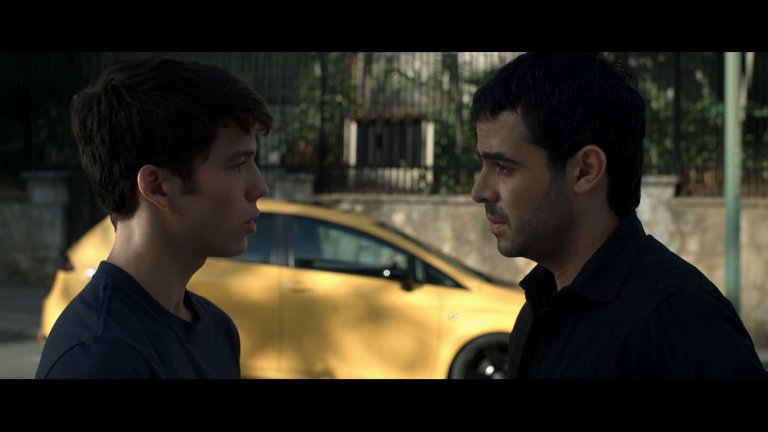
Hay tres temas que se desarrollan de forma diferente en la película:
1- La visión de la Homosexualidad como algo natural que tienen únicamente los protagonistas ya que son ellos quienes se desenvuelven en este mundo.
2- El tratamiento de la homofobia a través de las personas que abusaron o que maltrataron a Fabrizio (la pareja del protagonista) quienes lo dejan en coma o el hecho de que la hermana del protagonista haya dicho que prefiere que su hijo sea delincuente antes que homosexual.
3- La relación padre e hijo que tiene el protagonista con “Armandito”, su hijo, a quien no ha visto en muchos años y debe lidiar con las diferencias que tiene con él.
He de admitir que la primera vez que vi la película aún era muy joven pero que, de cierto modo, muchos aspectos y temas que esta trataba resonaron en mi interior y que ahora que la vuelvo a ver para la elaboración de esta reseña, tienen más sentido que nunca.
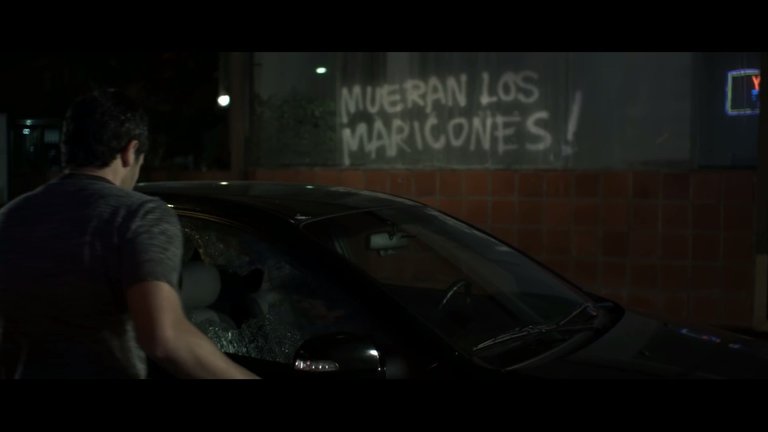
There are three themes that play out differently in the movie:
1- The vision of Homosexuality as something natural that only the protagonists have since they are the ones who develop in this world.
2- The treatment of homophobia through the people who abused Fabrizio (the protagonist's partner) who leave him in a coma or the fact that the protagonist's sister has said that she prefers her son be a criminal rather than homosexual.
3- The father and son relationship that the protagonist has with “Armandito”, his son, whom he has not seen in many years and must deal with the differences he has with him.
I have to admit that the first time I saw the film I was still very young but despite that, in a way, many aspects and themes the movie dealt with resonated within me and now that I see it again for the preparation of this review, they have more sense than ever.
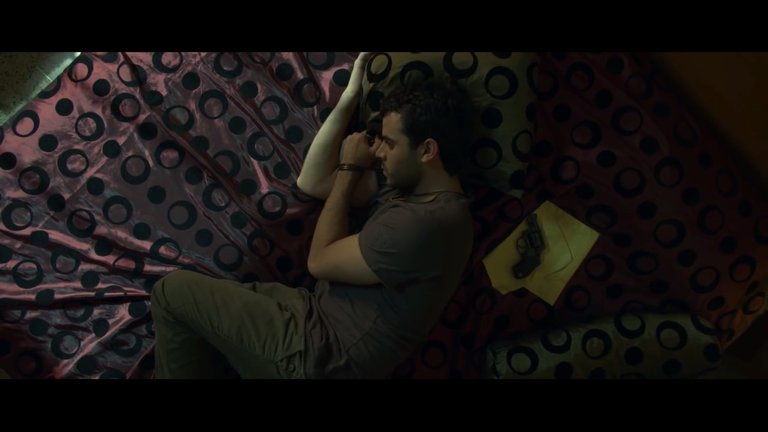
Me sentí identificado con muchos de los eventos que se muestran en el largometraje, pude sentir el miedo, la desesperación e incertidumbre que transmitían los actores a través de los personajes, los cuales son una realidad porque tristemente en Venezuela, la homosexualidad no es algo bien visto, o al menos en zonas no capitales del país. Aún sí, no todo es malo, ya que nos deja con una sensación de esperanza de un mejor mañana y nos hará reflexionar sobre nuestras acciones.
I felt identified with many of the events that are shown in the feature film, I could feel the fear, despair and uncertainty the actors transmitted through the characters, which are a reality because sadly in Venezuela, homosexuality is not seen as a good thing, or at least in non-capital areas of the country. Still, not everything is bad, as it leaves us with a sense of hope for a better tomorrow and will make us think on our actions.
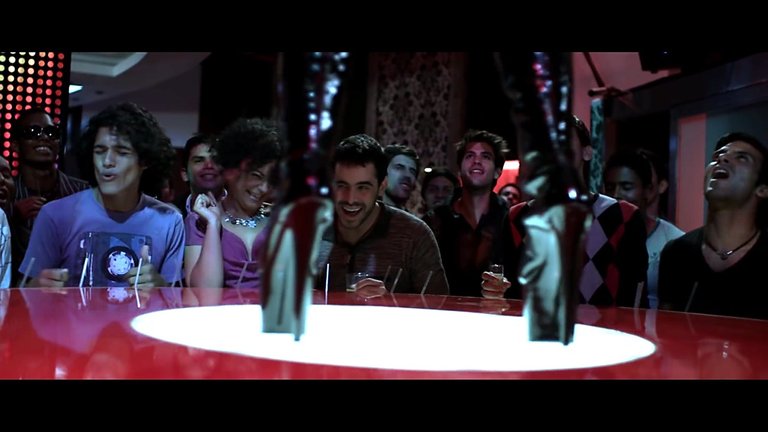
Para mí, Azul y no tan Rosa es la mejor película venezolana que he visto, puesto que trata temas que, a pesar del paso de los años, siguen siendo tabú en el país, muestra a el resto del mundo los problemas que muchas de las personas que formamos parte de la comunidad LGBTI+ sufrimos, además de que demuestra que la homosexualidad no es “depravación” o “libertinaje” como la sociedad lo quiere hacer ver.
For me, Azul y no tan Rosa is the best Venezuelan film I’ve ever seen, since it deals with topics that, despite the passing of the years, are still taboo in the country, it shows to the rest of the world the problems that many of the people who are part of the LGBTI + community suffer, in addition to showing that homosexuality is not "depravity" or "debauchery" as society wants it to be seen.
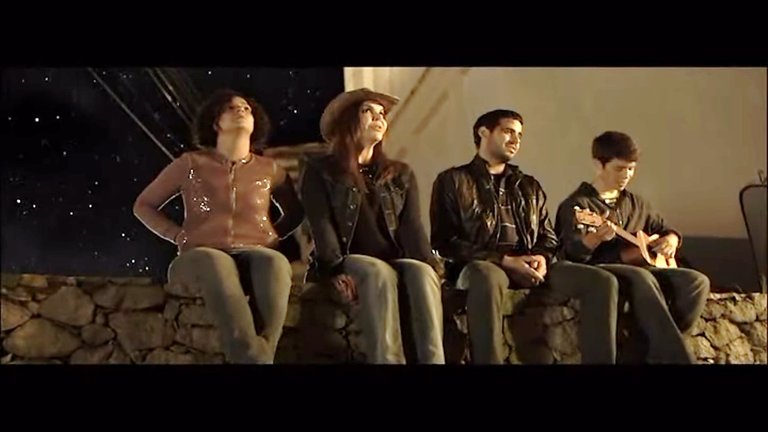
Disfruté mucho del dinamismo y la conexión que puede observarse entre los personajes, además de que el apartado musical sienta como anillo al dedo la película; me encantó ver de nuevo aquellos paisajes y edificios de Caracas en los que pude vivir 2 años cuando era niño, pero, en definitiva, mi parte favorita del filme es el gran mensaje que este nos deja:
“¿Cuantas veces señalamos a las personas por ser diferentes?; diferentes en su forma de pensar. En su forma de caminar, de vestir, de hablar o de amar… Maltratamos a otras personas porque las consideramos inferiores o menos inteligentes, porque tienen un color de piel diferente, hacemos chistes pesados de algunos porque pertenecen a otras culturas y tienen otras costumbres y creencias, nos sentimos con derecho a juzgar a otros solo porque tienen una opción diferente a la nuestra y nos olvidamos que vivimos en una sociedad plural donde todos tenemos cabida y todos debemos ser escuchado, y más aún las minorías que han sido marginadas y que hoy sufren una silenciosa discriminación.”
-Delirio del Río.
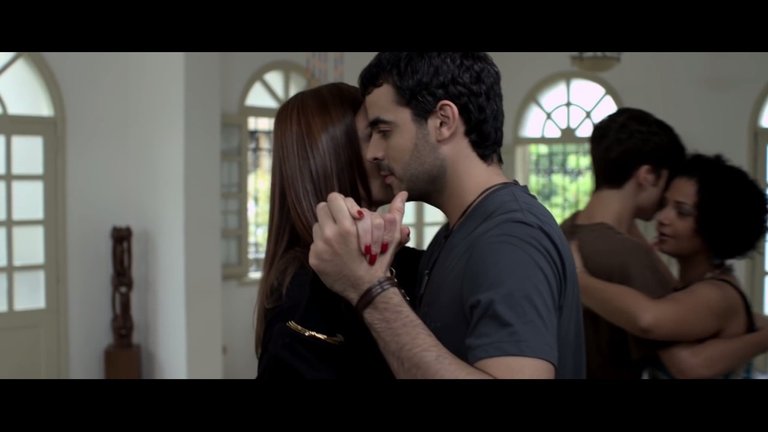
I really enjoyed the dynamism and the connection that can be observed between the characters, in addition to the fact that the musical selection fits like a glove to the film; I loved to see again those landscapes and buildings of Caracas in which I lived for 2 years as a child, but, in short, my favorite part of the film is the great message that it leaves us:
“How many times do we flag people for being different? Different in their thinking. In the way they walk, dress, speak or love ... We mistreat other people because we consider them inferior or less intelligent, because they have a different skin color, we make heavy jokes about some because they belong to other cultures and have other customs and beliefs, we feel entitled to judge others just because they have a different option than ours and we forget that we live in a plural society where we all have a place and we all must be heard, and even more so the minorities that have been marginalized and that today they suffer silent discrimination."
-Delirio Del Río
¡Nos vemos en la próxima! – See you in the next one!
Mi Calificación: 8/10
Título Original: Azul y no tan rosa
Título en inglés: My straight son
Director: Miguel Ferrari
Reparto: Guillermo García, Ignacio Montes, Hilda Abrahamz, Carolina López
Año: 2012
Imágenes extraídas del tráiler de la película. Desafortunadamente no se encuentra en ningún servicio de streaming, por lo que tuve que descargarla de internet y, como la calidad no era muy buena, no podía utilizarla para obtener capturas de pantalla.
My Score: 8/10
Original Title: Azul y no tan Rosa
English title: My Straight Son
Director: Miguel Ferrari
Cast: Guillermo García, Ignacio Montes, Hilda Abrahamz, Carolina López
Year:2012
Images were taken from the movie trailer. Unfortunately the movie can't be found on any streaming service, so I had to download it from the internet and since the quality was not very good, I could not use it to get screenshots.
Azul y no tan rosa es una de mis películas venezolanas favoritas, fue una de las primera películas que representó lo que es vivir como un homosexual en país homofóbico y machista. Tenía apenas 15 años cuando la vi, 14 cuando fue estrenada, y creo que fue una de las cosas que me permitió aceptarme un poco en ese momento y saber que estaba bien ser así, que a pesar de todo lo horrible que pudiera llegar a ser el mundo, uno tiene que seguir siendo uno mismo sin importar qué y no reprimirnos.
Am´w esta reseña, por favor, sigue escribiendo.
@jauregui98 muchísimas gracias por tu comentario <3, me alegra saber que no soy solo yo el que se siente identificado con esta película... También es una de mis favoritas puesto que realmente muestra como son las situaciones y peligros por los que podemos pasar simplemente por ser diferentes.
Azul y no tan rosa significó mucho para mí la primera vez que la vi, me hizo llorar 3 veces ahora que la volví a ver para la reseña ya que ocurren algunos eventos similares a los que pasé... Me sentí identificado por momentos y de verdad, es mi película venezolana favorita.
Gracias por el aliento a seguir escribiendo, espero no me falte inspiración para poder seguir haciéndolo :)
Es una película bastante controversial, pero muy bien llevada, confieso que el cine venezolano me parece un poco tosco, pero admito que esta en particular deja ver un gran trabajo. Tu reseña es muy buena.
Saludos
@slwzl me alegra que hayas podido disfrutar de la reseña, y sí, sé a lo que te refieres, por eso hago hincapié en que es una película totalmente fuera del esquema de lo que se conoce como "película venezolana"
Congratulations @bruscocf! You have completed the following achievement on the Hive blockchain and have been rewarded with new badge(s) :
Your next target is to reach 800 upvotes.
You can view your badges on your board and compare yourself to others in the Ranking
If you no longer want to receive notifications, reply to this comment with the word
STOPCheck out the last post from @hivebuzz:
A pesar de los nuevos tiempos, seguimos viviendo en una sociedad que se escandaliza por todo y por nada según le convenga, una sociedad capaz de juzgar, señalar y estigmatizar a placer, amparados en prejuicios y tabúes moralmente aceptados.
Esta película representa la voz de quienes aún viven silenciados por ser o sentir distinto a lo que dicta la norma social, me encantó cuando la vi, otra buena referencia del cine nacional. Buena elección.
Así es @gorayii, no pude haberlo dicho mejor que tú. Tristemente es así. Aún así se que las cosas cambiarán para mejor.